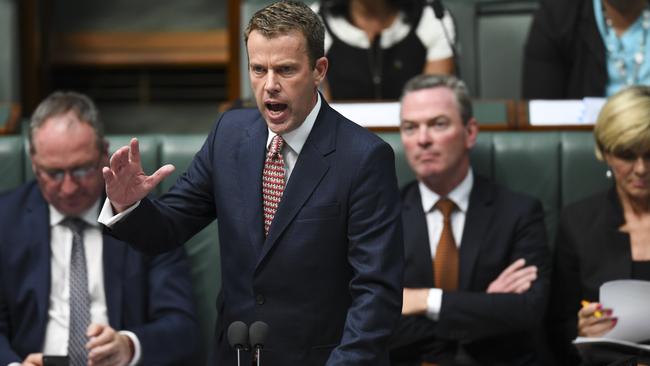States urged to be ‘big-hearted’, fund all disability services
States and territories have been urged to be ‘big-hearted’ and ring-fence money not just for the $22bn NDIS.

States and territories have been urged to be “big-hearted” and ring-fence money not just for the $22 billion National Disability Insurance Scheme but also for local programs slated for closure, amid fears the world-leading project will fail without them.
In a departure from his predecessor’s approach, federal Social Services Minister Dan Tehan has pleaded with state and territory ministers to work with the federal government, and even act against their own budget interests, to secure the future of the NDIS, which is threatened by a series of disputes over where the scheme begins and ends.
“It’s the catchcry of the Apollo mission: ‘failure is not an option’ when it comes to the NDIS,” Mr Tehan told The Australian.
“My pitch to the states is: please, where you can, look to be big-hearted, look to be generous of spirit, to say there are going to be areas, grey areas, which are going to have to be worked out.”
Previous minister Christian Porter, now Attorney-General, attempted to ram through changes to governance arrangements under the NDIS that would have given the federal government more control over the scheme and remove requirements for every major decision to be agreed unanimously at COAG. Mr Porter succeeded in watering down some of the legislative “rules” but relations with the states soured.
Mr Tehan’s attempt at a reset in relations has already soured, with Victoria’s Labor Disabilities Minister Martin Foley accusing the “heartless and bumbling” Turnbull government of placing the rollout in jeopardy.
“We don’t need to be lectured on the importance of giving Victorians with a disability, their carers and families a better life under the NDIS,” Mr Foley told The Australian.
“It has been the heartless and bumbling Turnbull and Abbott governments which have successively failed to deliver the NDIS and its promised benefits to Australians with disabilities.”
The Productivity Commission, on whose model the scheme was designed, issued an updated report on its costs late last year that bluntly warned “in-kind” funding arrangements should be cashed out as quickly as possible. Under these arrangements, governments can continue providing disability services but instead of charging market rates they can effectively bill the National Disability Insurance Agency for whatever they declare the cost of delivery to be.
The commission warned that so-called interface issues between the NDIS and other systems such as health, justice, education and mental health were “critical” to the financial sustainability of the project, but were surrounded in secrecy.
“Some disability supports are not being provided because of unclear boundaries about the responsibilities of the different levels of government,” the report says. “Governments must set clearer boundaries at the operational level around ‘who supplies what’ to people with disability, and only withdraw services when continuity of service is assured.”
Health Minister Greg Hunt was forced to step in last year to pledge $80 million to community mental health programs at the state and federal level — on the condition it was met dollar-for-dollar by each jurisdiction to cauterise an emerging mental health crisis.
Many people who do not qualify for the NDIS are facing a future where old state and federal-funded programs are being phased out and the funding redirected to the flagship national scheme.
Mr Tehan said that, as much as he would “love to rewrite history” and draw better contracts for the delivery of the NDIS, all governments were bound to work within the agreements they now had. “Don’t withdraw your payments, don’t withdraw your services as the first option, look to say ‘we want to work with you, can we keep this program going for an extra couple of years?’” Mr Tehan said. “What we are going to need though is making sure that all of us are going to our treasuries and saying, ‘understand the importance of this’. There are lots of issues that require cooperative federalism but this one really does.”
The NDIS is almost equally funded between state and federal governments and governance arrangements require unanimity of all COAG parties before major changes can be made.
NSW Disability Services Minister Ray Williams said the state had “committed every cent of its ($3.2bn) disability budget to the NDIS” in the next financial year.
“As agreed with the commonwealth, from July 2018 the NSW government will not be a provider of any specialist disability supports or basic community care services,” Mr Williams said.
He also said “current supports for all people with disability not eligible for the NDIS” would continue. However the Berejiklian government plans to axe $10.9m in advocacy funding this July, which it has transferred to the NDIS, although the national scheme will not provide any advocacy services at all.
South Australia’s Disabilities Minister Kathrine Hildyard said she agreed all governments needed “big hearts” when approaching the NDIS but “we also need action”. “Beside the $723m annual investment by the South Australian government in the NDIS, we have extended our commitment by funding mental health, transport and other programs so people don’t fall through the cracks while we are transitioning,” Ms Hildyard said.
“We need the Turnbull government to keep its promises and work with us to deliver a quality scheme.”
A spokeswoman for Queensland Premier Annastacia Palaszczuk said the state would “continue to put Queenslanders with a disability first during these negotiations”.


